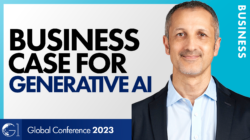From the outside, venture capital can seem like a lockbox. How do venture capitalists make their decisions about who to invest in? Or who not to invest in? What are the keys to becoming an industry success, and who can teach them?
Alan Patricof has over fifty years of experience working in venture capital. He founded Apax Partners, a leading global private equity advisory firm, and cofounded Greycroft, a venture capital firm focusing on investments in the internet and mobile markets. Today, he is cofounder and chairperson of Primetime Partners.
Thirty years ago, he was also one of the first to invest in Yoshito Hori, a young Japanese man with a vision to start a business school in Tokyo. Hori went on to become founder and president of GLOBIS University and launch Apax GLOBIS Partners and Company, the foundation of GLOBIS Capital Partners, which would become the largest independent venture capital fund in Japan.
In this video, Patricof talks about working with business owners, leveraging buyouts, and staying active—even now, at almost ninety years old. Below is a transcript of his keynote speech, edited for clarity. Watch the video above for a dialogue with Hori and response to audience Q&A.
Next Article
10 Tips for Becoming a Great Venture Capitalist
Alan Patricof, Legendary Venture Capitalist
How Venture Capital Has Changed over the Last 50 Years
Patricof: I remember clearly my first days going to Japan, after having been visited by Hori-san in New York, and the formation of what is now GLOBIS Venture Capital. [That was] in the early days of venture capital in Japan, and it reminded me of the very early days of forming a venture firm in 1970.
There were many similarities. It was a nascent industry. There were a lot of naysayers around. There were not a lot of risk takers around, and there was a lot of skepticism as to whether the concept of venture capital really had a future in society.
Fifty years later, I don’t think there’s any question that venture capital plays a major role in almost every country in the world.
It’s interesting that in recent months we in the United States have started investing in venture capital activities in Africa, which I tried to promote five and ten years ago. Now everybody is turning their attention to Africa with opportunities.
The Target Audience for No Red Lights
Patricof: I have recently written my first—and I assume last—book, No Red Lights. I wrote this book for two audiences: the younger and older people.
Over the years, I have noticed many younger people become very myopic in their lifestyle and get focused on what they do day to day. They become so absorbed in their day-to-day activities that they don’t smell the flowers or taste the opportunities. And what’s made my life interesting enough to write a book is that I have no red lights in my life and never have.
I wanted to encourage younger people: Don’t get caught in a rut. Don’t get caught in one focus in your life. Taste politics. Taste art. Taste theater, music, dance, and travel. Whatever opportunities come to you, don’t let them pass you by. Seek them out. I want younger people to have more openness to opportunities as they grow in their careers.
On the other end, I wanted to encourage older people that it’s never too late to start something new. They shouldn’t think at a particular age that it’s time to cash in their chips and relax their lifestyle, but rather think about the later part of their life as a big opportunity.
I am very proud to say that I started my first firm APAX in 1970. My second firm, I started in 2006 at the age of seventy-two. And at age eighty-five—two years ago, I decided to start yet a new firm, which is called Primetime Partners, which is focused on product services, experiences, and technologies for what I call the “ageless generation.”
So the purpose of the book was to really inspire people. On the young end, I want people to take advantage of opportunities. On the older end, I want people to think about what the next chapter in their life could be.
The Benefits of Living with a Long-term Mindset
Patricof: Ten years ago, I heard a gerontologist, a person who deals with the elderly, give a speech talking about what modern life expectation was, and they said it was 114. I like that idea of 114. So I set a goal of 114.
I’ve been saying that for the last ten or fifteen years. If you have a mindset that you’re going to have a long life ahead of you and you’re coming to the later part of your career, you realize that a sixty-year-old has really only lived half their life.
I wrote this book, and it’s the way I have lived my life. I try. I wake up every day and try to do everything. I exercise. I have meetings. I go to conferences. I go to the ballet. I live a full life.
It’s two years later than when I started Primetime at eighty-seven and I’ve set forth a goal of going to Burning Man at the end of August. I’ve decided to jog the New York marathon in November.
I say these things because life brings a lot of opportunities. I was fortunate enough to pick a career where I am in contact all the time with young people and young ideas. And I have managed to build a career in a very exciting field.
Why Alan Patricof Views Life as Cumulative
Patricof: The way I live my life, everything in life is cumulative. We tend to think of things in isolation, but the fact is that what you did in school, the lessons you learned, the people you met, the experiences you had, and the jobs you’ve had are cumulative.
I started my first business after four increasingly interesting jobs. I changed jobs after college because I saw bigger opportunities, again, fitting the style of taking on new challenges. And I say in the book that when the color of the office you’re sitting in starts to get very bland, maybe that’s the time to move on.
In venture capital, you have to raise new funds every few years. And I have a favorite saying regarding the concept of life as cumulative. I raised my last fund in three months and people say, “God, how could you raise a fund in three months?”
And my answer is always the same. In this case, it took fifty years and three months. When you build a career, it increasingly stays with you and helps to build a reputation, which becomes important as you mature.
Building a Good Reputation
Patricof: Every day of my life in the last twenty years, without exception, someone comes up to me and starts the same way.
“You don’t remember me, but…” And it’s, “You don’t remember me, but you invested in my company.” “You don’t remember me, but I worked for your first firm.” “You don’t remember me, but you answered my telephone call when no one else would.”
So I decided to write [an article on LinkedIn] entitled: “You Don’t Remember Me, But.” It dealt with the concept of how to build a reputation so that when people come up to you, they don’t remind you of something that you would like to forget.
Part of being in the venture business is learning how to say no in a way that doesn’t hurt someone’s feelings. It’s important to remember that, no matter how crazy an idea seems, to the person who believes in it, it’s the most important thing in their life. And when you turn it down, it’s like saying their child isn’t pretty.
So consider how you treat people in your life. I have a policy I’ve always practiced: I return every phone call I get within twenty-four hours. I still write handwritten notes, and I try to remind myself every day that treating people well is important to building a reputation and a career.
The Key Characteristics of Successful Venture Capitalists
Patricof: I went into venture capital because I was curious. That, I think, is the most critical characteristic for someone in venture capital. To wake up and look around you at new things and old things. Read every opportunity, everything you can see, and follow it through to find out where it comes from or what it’s about.
Try to spot early trends. As new developments are taking place (and they do every day) there’s something new happening in the world. You have to be very aware of what’s going on. So I’d say curiosity is the single most important element [of this industry].
Obviously, having financial skills is important. Good judgment is extremely important because venture capital is not a science. It really is an art.
Over time, you develop this concept of pattern recognition. [Eventually], you can spot that in entrepreneurs who are starting something: what their skill level is, what their passion is, what their determination is, how skillful they are at building a team. And I think those are the characteristics that will make someone a good venture capitalist.
Again, it all fits together. I am someone who still, to this day, attends conferences. And whenever I address our internal meeting every year, I always say the same thing. If you go to an event like today’s discussion, if you come away with one good idea, it’s worth the effort.
Unfortunately, most of us go to conferences, and we are trying to absorb a lot. I always say just [look for] one good idea, one good, relationship. You develop one good idea. You walk away with one new concept.
I encourage all the people who work for our firms when they go places to always make new friends. Go put yourself in an area where you are uncomfortable, and that’s the way you build relationships. Because the people you meet on your way up are going to be with you for the rest of your life.
Private Equity vs Venture Capital
Patricof: The firm I’ve started now, Primetime, is all startups. We have to equate the risk and the potential reward, as opposed to the private equity business where there’s a whole different set of characteristics.
I left Apax because it had morphed from a venture firm into a private equity firm. And the characteristics of a venture firm are really more early-stage judgment, market extrapolation, and looking at address markets expecting growth rates. As opposed to private equity, which is more of a financial business with discounted present-value calculations.
It takes on a different nature. It’s more debt and equity-financed as opposed to equity-only in the venture business. And I just wanted to taste again the challenges of venture investing. That’s why I started my second firm, Greycroft, which is more of a venture operation.
Primetime is purely, purely in the startups. And when you invest in startups, you have to accept a different kind of risk profile.




